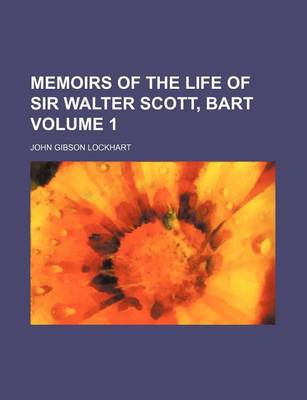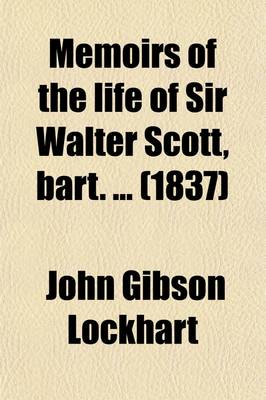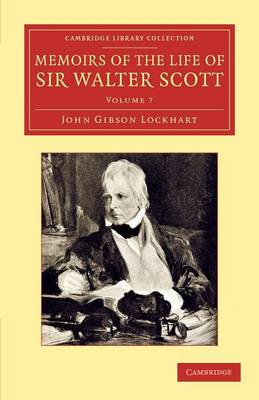Memoirs of the Life of Sir Walter Scott, Bart 7 Volume Set
4 primary works
Volume 1
Memoirs of the Life of Sir Walter Scott, Bart Volume 1
by John Gibson Lockhart
Published 9 September 2010
As son-in-law and literary executor to Sir Walter Scott (1771-1832), John Gibson Lockhart (1794-1854) was uniquely placed to produce a definitive biography of the great poet and novelist. First published in 1837-8, shortly after Scott's death, this celebrated seven-volume work is based on personal memories, correspondence, and Scott's own autobiographical sketches. Wide-ranging in his purview, Lockhart is also detailed in his descriptions: the Aberdeen Journal of the day observed that the volumes trace Scott's life and literary efforts with 'the most minute distinctness'. Volume 1 opens with Scott's brief autobiography, written in 1808 and revised in 1825. Lockhart's biography proper opens with Scott's birth in 1771, provides an account of his education, and concludes here with his first contributions to the Edinburgh Review in 1804.
Volume 2
Memoirs of the Life of Sir Walter Scott, Bart (Volume 2)
by John Gibson Lockhart
Published 13 January 2012
As son-in-law and literary executor to Sir Walter Scott (1771-1832), John Gibson Lockhart (1794-1854) was uniquely placed to produce a definitive biography of the great poet and novelist. First published in 1837-8, shortly after Scott's death, this celebrated seven-volume work is based on personal memories, correspondence, and Scott's own autobiographical sketches. Wide-ranging in his purview, Lockhart is also detailed in his descriptions: the Aberdeen Journal of the day observed that the volumes trace Scott's life and literary efforts with 'the most minute distinctness'. Incorporating accounts of Scott's correspondence with Southey, Wordsworth and Byron, Volume 2 opens with the death of Walter's uncle, Captain Robert Scott, in 1804, leading readers through the commencement of Waverley and the foundation of the Ballantyne publishing firm. This portion of Lockhart's account concludes in 1812.
Volume 3
Memoirs of the Life of Sir Walter Scott, Bart (Volume 3)
by John Gibson Lockhart
Published 31 January 2012
As son-in-law and literary executor to Sir Walter Scott (1771-1832), John Gibson Lockhart (1794-1854) was uniquely placed to produce a definitive biography of the great poet and novelist. First published in 1837-8, shortly after Scott's death, this celebrated seven-volume work is based on personal memories, correspondence, and Scott's own autobiographical sketches. Wide-ranging in his purview, Lockhart is also detailed in his descriptions: the Aberdeen Journal of the day observed that the volumes trace Scott's life and literary efforts with 'the most minute distinctness'. Volume 3 opens in 1812 with an account of 'one of the busiest summers of Scott's busy life', during which he finally moved into his beloved Abbotsford. Incorporating extracts from Scott's correspondence with the English poet George Crabbe, this volume covers the period in which Scott finished Waverley (1814) and published in verse The Field of Waterloo (1815).
Volume 7
As son-in-law and literary executor to Sir Walter Scott (1771-1832), John Gibson Lockhart (1794-1854) was uniquely placed to produce a definitive biography of the great poet and novelist. First published in 1837-8, shortly after Scott's death, this celebrated seven-volume work is based on personal memories, correspondence, and Scott's own autobiographical sketches. Wide-ranging in his purview, Lockhart is also detailed in his descriptions: the Aberdeen Journal of the day observed that the volumes trace Scott's life and literary efforts with 'the most minute distinctness'. Volume 7 covers the period from 1826 until Scott's death in 1832. This was perhaps the darkest chapter in Scott's life, during which his financial woes forced him to sell the copyright for the Waverley novels. This final volume also includes an appendix listing Scott's publications as well as an index of names.



